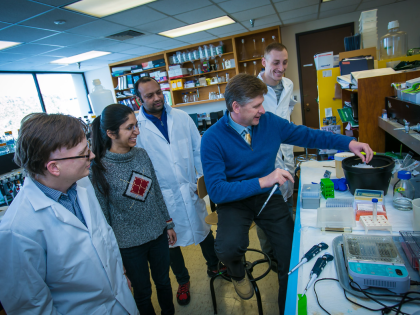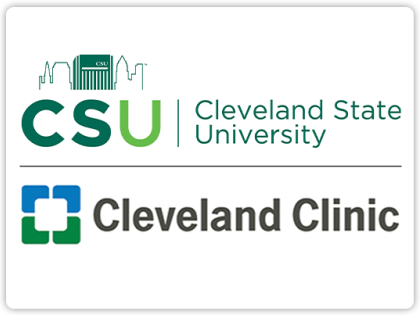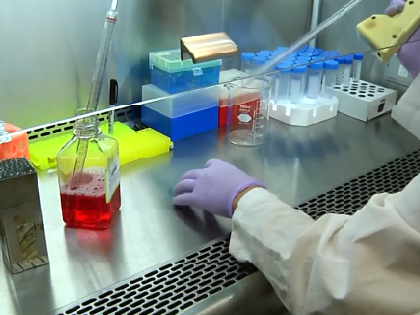Biological, Geological, and Environmental Sciences
Contact Info
Mailing Address
Cleveland State University
Bio., Geo., & Env. Sciences
2121 Euclid Avenue, BGES
Cleveland, Ohio 44115-2214
Campus Location
Science Building (SI)
2399 Euclid Avenue, Rm. 219
Contact Us
Phone: 216.687.2440
Fax: 216.687.6972
bges@csuohio.edu
Doctoral Degree

The Department of Biological, Geological, and Environmental Sciences offers cutting-edge research in cell and molecular, and ecological and environmental science leading to the Doctor of Philosophy in Regulatory Biology, which is run as a joint venture with the Cleveland Clinic’s Lerner Research Institute. The Doctor of Philosophy includes an optional Cellular and Molecular Medicine Specialization. These programs are open to full-time and part-time students.
Graduates are employed in research, teaching, and administrative positions in private industry, hospitals, governmental agencies, environmental action groups, and colleges and universities in the Cleveland area, throughout the United States and abroad.
The graduate program also attracts established teachers, research scientists, and management and staff in diverse businesses with a biological, environmental, or biomedical focus. The graduate program is open to full-time and part-time students as well as to non-degree students who are preparing themselves for entry into degree programs or are seeking to keep abreast of new developments in their fields of interest.
Admission Requirements
Applicants to the Ph.D. program in Regulatory Biology should meet the minimum requirements established by the College of Graduate Studies and the Ph.D. program faculty:
- Undergraduate grade point average of 3.3 or higher; master’s grade point average or combined undergraduate-master’s grade point average of 3.5 or higher.
- Graduate Record Exam (GRE) or MCAT scores at the 50th percentile or better in each category, or Research Portfolio (contact the program director for more details). Research Portfolio must include:
- A summary of their previous research projects to the program director (to briefly describe the biological question, the research tools, and the major conclusions)
- An additional recommendation letter focusing on the student’s research experience including their work ethic, learning and corporation abilities.
- Published papers if available
- Two letters of recommendation.
- Statement of purpose, which includes the applicant’s research interests.
- International students and students whose degrees were awarded outside the U.S. must submit scores from the TOEFL, IELTS, or iBT; a TOEFL speaking score of 26 or better is required for the awarding of a teaching assistantship.
Program Requirements
Students in the Doctor of Philosophy Degree in Regulatory Biology program are required work with a Major Advisor and an Advisory Committee, complete a minimum of 90 credit hours with a minimum grade-point average of 3.0, fulfill a teaching requirement, complete the Doctoral Candidacy Examination, complete at least one year in residency as full-time student, and complete the exit requirements (presentation, defense, and submission of dissertation). For more information, please visit the program catalog.
Learn more about the Ph.D. in Regulatory Biology program and admission requirements
Departmental facilities include a large animal-care facility, cold rooms, darkrooms, fluorescent microscopes (a Nikon A1Rsi Laser Scanning Confocal and a Deltavision Deconvolution Microscope) and light microscopes, a BD FACS Canto II Flow Cytometer, an Amersham Typhoon 5 imager, a Typhoon 9410 imaging scanner, Beckman Optima L90K ultracentrifuges, a Beckman J26XPcentrifuge, an Avanti centrifuge, an Odyssey Fc Imaging System, cell culture facilities, a scintillation counter, an AKTA purifier FPLC system, Heska Hematology and Element Analyzers, a Sartorius BLI Octet interferometer, a 96-core high performance computer with an Nvidia A2 GPU and one TB of RAM, a Nikon Ti2-E inverted microscope with an Abberior Stedycon STED laser system, and an assortment of computers with Internet access.
Most CC faculty are located in the new Research and Education Building of the Lerner Research Institute, with its state-of-the-art facilities, including a vivarium and core facilities for biotechnology, transgenic mice, flow cytometry, microscopy, protein sequencing, and hybridoma work.
Full-time graduate students pursuing thesis or dissertation research may be supported through teaching assistantships through the department or research assistantships offered by individual faculty. This support includes tuition and a stipend. Typically, this support does not exceed six (6) years. Full-time teaching assistants are expected to work twenty hours per week and must enroll as fulltime students (currently nine credit hours, including research credits).
Research assistantships may be available through the research grants of individual faculty. A limited number of graduate tuition waivers, which carry a service requirement of ten hours of work per week, may be awarded to students with superior credentials, as funds are available.
Awards are granted through a competitive process, where all application materials are assessed and taken into consideration. The initial decisions are typically made based on completed applications received by March for the fall semester and, if additional assistantships are available, in November for the spring semester. Required minima for grade-point average, GRE scores, and TOEFL score are higher than those for admission to the program. In order to hold a teaching assistantship, non-native English-speaking teaching assistants must be assessed and certified as proficient in spoken English. Among other options to prove proficiency, Non-native English speakers may take and pass the SPEAK test at the CSU Testing Center.
The Ph.D. program provides a comprehensive background in biological science with a focus on regulation in biological systems ranging from the molecular to the ecosystem level. Cleveland State University and the Cleveland Clinic offer the program jointly. Besides course work, a comprehensive exam, and teaching experience, the degree requires a written dissertation, based on original scientific research of sufficient quality for publication in a peer-reviewed scientific journal. For more information, please contact the program director.
Program Director

Dr. Bibo Li
Graduate Program Director & Graduate Advisor (BIO MS Program, PHD)
216-687-2444
b.li37@csuohio.edu
Request Information
Contact Info
Mailing Address
Cleveland State University
Bio., Geo., & Env. Sciences
2121 Euclid Avenue, BGES
Cleveland, Ohio 44115-2214
Campus Location
Science Building (SI)
2399 Euclid Avenue, Rm. 219
Contact Us
Phone: 216.687.2440
Fax: 216.687.6972
bges@csuohio.edu




